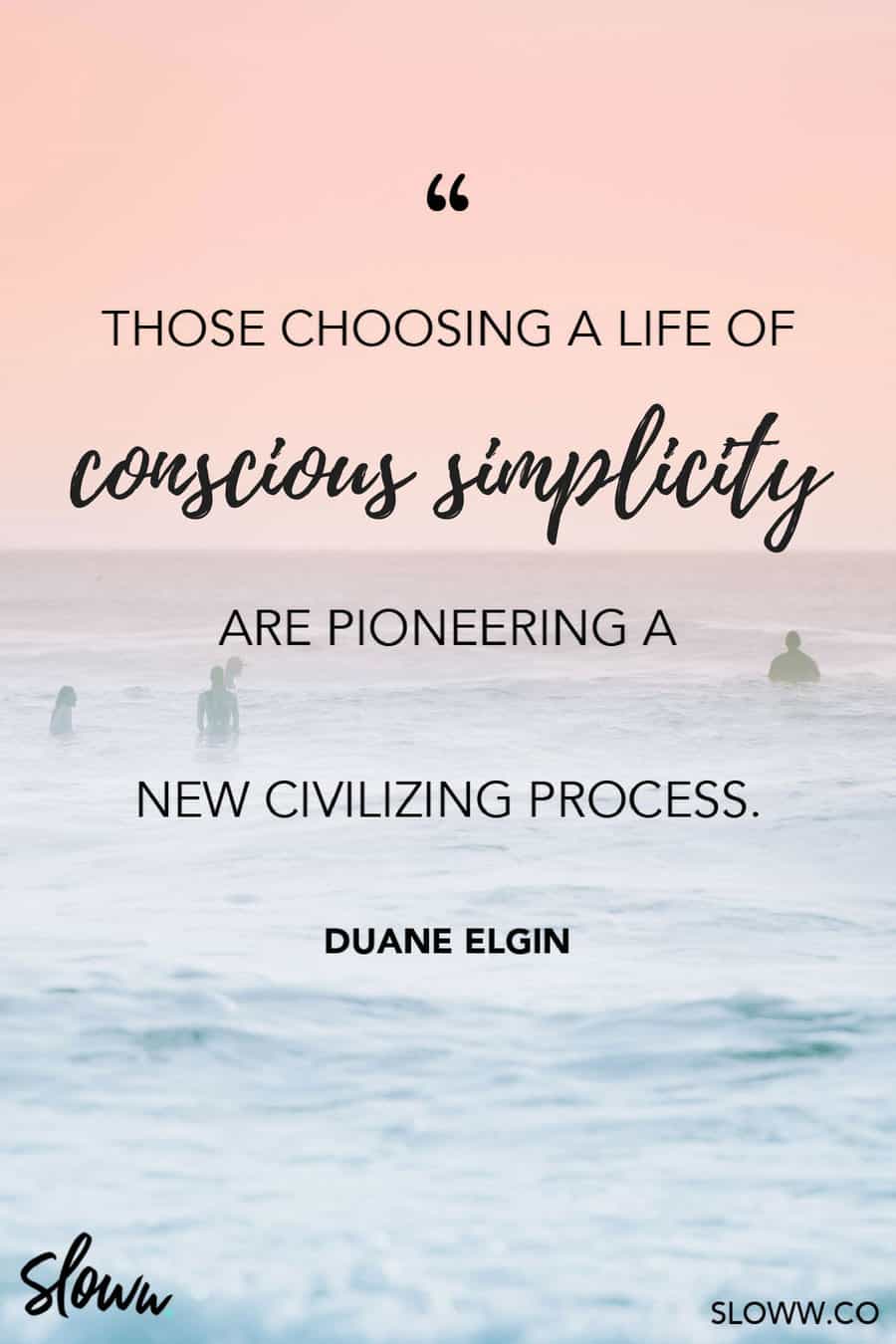
This is the second post inspired by the book Voluntary Simplicity by Duane Elgin. You can see the first post here: Top 10 Most Common Reasons for Choosing Simple Living.
I truly think this may be one of the most important posts that will ever appear on this blog.
Why is it so important? It’s a complete mindset shift to think about simple living as progress instead of regress. It’s not reverting to a simpler time in the past or necessarily a back-to-the-land movement.
I believe this is critical to “marketing” simplicity to mainstream society: building awareness and belief, changing behaviors, and becoming a sustainable society of the future. Many more people will be on board if simplicity is viewed as sophisticated evolution.
Voluntary simplicity does not mean a return to a more primitive past but rather a movement ahead to a more sophisticated, compassionate, and collaborative future. — Duane Elgin
Simplicity is Evolutionary Progress, not Regress
Elgin offers the following definition of progress:
Integrating the historical insights of (Arnold) Toynbee and the material insights of (Buckminster) Fuller, we can redefine progress as follows: Progress is a twofold process involving the simultaneous refinement of the material and nonmaterial aspects of life.
Toynbee found a strong connection between simplicity and human progress.
And, Elgin summarizes the purpose and promise of the human journey as:
Humanity is on a heroic journey of awakening into the stunning reality that we are beings of cosmic connection and participation who are learning to live within a living universe.
A growing group of people are already aware of this and leading the way:
Pioneers of Earth-friendly living reveal that ‘small is beautiful.’ Small changes that seem inconsequential when viewed in isolation are of revolutionary significance in their cumulative impact.
And, of course, now that you and I have awareness from reading this, we are responsible too:
We are each responsible for the conduct of our lives—and we are each unique. Therefore we are each uniquely responsible for our actions and choices in this pivotal time in human evolution. There is no one who can take our place. We each weave a singular strand in the web of life. No one else can weave that strand for us. What we each contribute is distinct, and what we each withhold is uniquely irreplaceable.
A simple, sustainable, and sophisticated vision of the future sounds great! But, where are we today?
Humanity’s Challenges Today:
Elgin covers all the global adversity trends, including: unsustainable population growth, wide and deep poverty, profound climate disruption, the end of cheap oil, global water shortages, mass extinction of plant and animal species, and our unsustainable global footprint.
However, he believes there’s one challenge that’s bigger than all our physical crises: “a crisis of consensus around a collective vision for a promising future.”
Despite the severity of our physical problems, our deepest challenge is to overcome an invisible crisis: a lack of collective consensus and cohesion around a compelling sense of purpose. — Duane Elgin
Humanity is Currently in the Teenage Stage of Development
I thought this was an interesting exercise. Elgin has been a speaker all over the world over the last few decades. He would ask his audiences the same question:
When you look at the overall behavior of the human family, what life-stage do you think we are in? In other words, if you estimate the social average of human behavior around the world, what stage of development best describes the human family: toddler, teenager, adult, or elder?
And, regardless of region, continent, country, ethnicity, religion, or anything else, he would get the same answer:
With little hesitation, people consistently vote that, as a social average, the overall human family is in its teenage stage of development.
Around the world, there is clear intuition and understanding that, putting us all together, the human family exhibits many adolescent behaviors. Here are examples often mentioned: Teenagers are rebellious and want to prove their independence. Humanity has been rebelling against nature, trying to prove that we are independent from it. Teenagers are reckless and tend to live without regard for the consequences of their behaviors, often thinking they are immortal. The human family has been recklessly consuming natural resources as if they would last forever. Teenagers are concerned with outer appearance and with fitting in materially. Many humans are intensely concerned with how they express their identity and status through material possessions. Teenagers are drawn toward instant gratification. As a species, we are seeking our short-term pleasures and largely ignoring the long-term needs of other species and future generations.
The Simplicity Shift
Ronald Inglehart has been leading the work on the World Values Survey and has seen humanity’s values shifting over time:
Emphasis is shifting from economic achievement to postmaterialist values that emphasize individual self-expression, subjective well-being, and quality of life. As well, people in these nations are placing less emphasis on organized religion and more emphasis on discovering their inner sense of meaning and purpose in life.
As mentioned earlier, some people have been shifting for a long time now:
Beneath the surface of modern society, a deep shift has been under way for more than a generation. This shift responds to the excess of consumer society and reveals a search for greater balance in living.
The phase of material growth has matured and now requires a shift (or downshift) to growth in nonmaterial ways:
A portion of our species has experienced a period of extraordinary material growth and is now moving into a stage where further growth could be primarily of a nonphysical nature. In turn, this would liberate resources for those in desperate need and foster a more peaceful world.
Simplicity Supports a Higher Quality of Life
Elgin says, “Simplicity that is voluntary—consciously chosen, deliberate, and intentional—supports a higher quality of life.” He goes on to list the following rationale:
- Fosters a more harmonious relationship with Earth
- Promotes fairness and equity among people
- Cuts through busyness, clutter, and complications
- Enhances living with balance—inner and outer, work and family, family and community
- Reveals the beauty and intelligence of nature’s designs
- Increases resources available for future generations
- Helps save animal and plant species from extinction
- Responds to global shortages of oil, water, and other vital resources
- Keeps our eyes on the prize of what matters most in life — the quality of our relationships with family, friends, community, nature, and cosmos
- Yields lasting satisfactions that more than compensate for the fleeting pleasures of consumerism
- Fosters the sanity of self-discovery and an integrated approach to life
- Blossoms in community and connects us to the world with a sense of belonging and common purpose
- Simplicity is a lighter lifestyle that fits elegantly into the real world of the twenty-first century
“Far from withdrawal, a path of conscious simplicity promotes our intimate involvement with life.”
- With conscious and direct involvement comes clarity.
- With clarity comes insight.
- With insight comes love.
- With love comes mutually helpful living.
- With mutually helpful living a flourishing world civilization is made possible.
- Rather than abandoning the world, those choosing a life of conscious simplicity are pioneering a new civilizing process.

What do you think? Are you on board with the future of simplicity and the next stage of development in the human evolutionary journey? After all, we will only be here for 1% of recorded history. Please share your thoughts in the comments.





